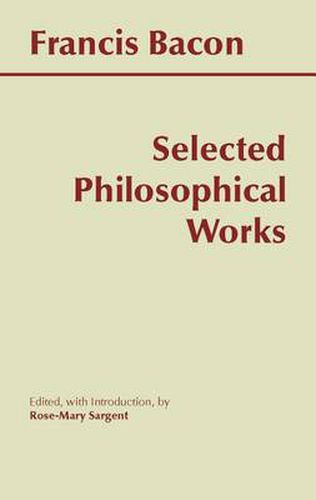Readings Newsletter
Become a Readings Member to make your shopping experience even easier.
Sign in or sign up for free!
You’re not far away from qualifying for FREE standard shipping within Australia
You’ve qualified for FREE standard shipping within Australia
The cart is loading…






The most comprehensive collection available in paperback of Bacon’s philosophical and scientific writings, this volume offers Bacon’s major works in their entirety, or in substantive selections, revised from the classic 19th century editions of Spedding, Ellis, and Heath. Selections from some of Bacon’s natural histories round out this edition by showing the types of compilations that he believed would most contribute to the third part of his Great Instauration.
Each work has a separate brief introduction indicating the major themes developed. In her general Introduction, Sargent gives a biographical sketch of Bacon’s early life, education, and legal career, discusses the major components of his philosophical project, and traces his influence on subsequent natural philosophy. In addition, she looks at the primarily negative evaluations of Bacon’s methodological writings by philosophers of science in the first half of the twentieth century, the reassessments of his works that took place as the influence of logical empiricism declined, and the current revival of interest in Bacon that coincides with the focus on experimental practice today.
A bibliography and index complete the text.
$9.00 standard shipping within Australia
FREE standard shipping within Australia for orders over $100.00
Express & International shipping calculated at checkout
The most comprehensive collection available in paperback of Bacon’s philosophical and scientific writings, this volume offers Bacon’s major works in their entirety, or in substantive selections, revised from the classic 19th century editions of Spedding, Ellis, and Heath. Selections from some of Bacon’s natural histories round out this edition by showing the types of compilations that he believed would most contribute to the third part of his Great Instauration.
Each work has a separate brief introduction indicating the major themes developed. In her general Introduction, Sargent gives a biographical sketch of Bacon’s early life, education, and legal career, discusses the major components of his philosophical project, and traces his influence on subsequent natural philosophy. In addition, she looks at the primarily negative evaluations of Bacon’s methodological writings by philosophers of science in the first half of the twentieth century, the reassessments of his works that took place as the influence of logical empiricism declined, and the current revival of interest in Bacon that coincides with the focus on experimental practice today.
A bibliography and index complete the text.